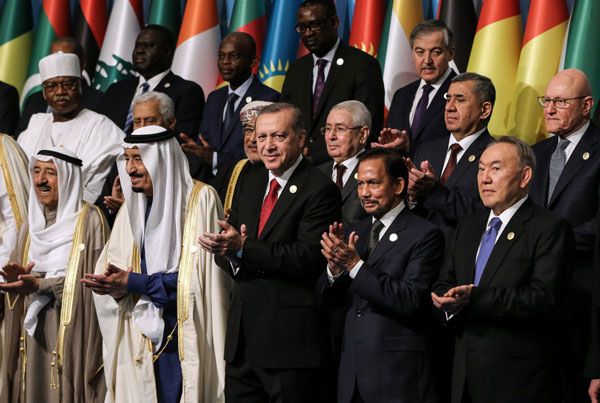The Loud Silence of OIC on Uighur’s Plight

Pemimpin-pemimpin OIC dalam KTT-nya di 2016. Foto: Anadolu Agency.
Before her term ended, the UN High Commissioner for Human Rights, Michelle Bachelet published its latest report on the condition of Uyghur people in Xinjiang region, China. The report is frank in its assessment of the situation, describing “serious human rights violations” that have been committed in Xinjiang by the Chinese government. The report acknowledges the allegation of torture, mistreatment, and adverse condition of detention as credible and even stated the current policy in Xinjiang may constitute international crimes, particularly crimes against humanity. Uyghur’s rights campaigner has described the report as a game changer and paved the way for meaningful and tangible action by member states of the UN.
The Uyghurs have faced persecution by Beijing for a long time, but the current situation can be traced back to the late 2010s. As a response to a series of unrest in the Xinjiang region, Beijing enacted on 31 March 2017, “The Xinjiang Uyghur Autonomous Region (XUAR) Regulations on De-Extremification,” paved the way to a policy of mass extra-judicial internment, labelled as vocational training centres by Beijing. Inside these “internment camp,” condition was really appalling. There were reports of deaths in the camps through malnutrition, unsanitary conditions, withheld medical care, and violence. People that have graduated from the camps were sent into securitized forced labour.
Western countries especially democracies in Europe, North America and the Pacific acknowledge the information and report made by the OHCHR (Office of the United Nations High Commissioner for Human Rights) and quickly condemned Beijing and urges a reverse in their policy in Xinjiang based on OHCHR’s recommendation. The United States and the United Kingdom have stated that the reports show that China must be held to account for the atrocities they conducted towards the Uyghur. Meanwhile, China has vehemently denied the report substances and described it as the latest attempt by the western government to hijack the UN and tried to use it as a political tool to contain China.
What’s interesting or maybe more disturbing is the lack of voice from the rest of the international community, particularly from the Islamic countries about the report. At the time of writing of this piece, there is a lack of statements from various Islamic countries acknowledging the OHCHR report. This is the same community that has been very vocal about Muslim minority conditions in other countries. OIC has described as early as 2018 the situation befalls Rohingya in Myanmar as ethnic cleansing. In 2019, on behalf of the Organization of Islamic Conference (OIC), The Gambia brought Myanmar to the International Court of Justice (ICJ) on accusations of genocide and systemic killing of the Rohingya Muslims by the Myanmar government. In 2022, the ICJ ruled that it has jurisdiction and will move forward to examine Gambia’s genocide allegation against Myanmar.
Both cases were an internal matter, one situated in Rakhine state, Myanmar and the other in Xinjiang, China. Both cases were described as crimes against humanity by the international community and should elicit the same responses. But why does the OIC only condemn Myanmar and bring it into the ICJ? If OIC can pursue genocide allegations against Myanmar, shouldn’t it have done the same to China or at least condemned it with the same language?
There are several factors on why Islamic countries and OIC are silent against China. The first would be China’s sensitivity to criticism. China is very defensive on issues that they see constitute “domestic policy.” It is not restricted to Xinjiang, other issues such as Taiwan and COVID-19 have also been described as domestic issues of China and foreign countries should stay away from them. If any countries dare to criticize or question China on its “domestic policy,” then there will be repercussions. One example of this is Australia, which in May 2020 calls for an international investigation into the origin of the COVID-19 virus. China responded by banning exports from several Australian beef facilities and placing an 80% tariff on Australian barley.
The second would be economic relations between OIC and China. Both have a close relationship with each other. In March 2022, Wang Yi, China’s Foreign minister announced that China will invest US$ 400 Billion in different projects across Muslim countries as part of the Belt and Road Initiative (BRI). This announcement comes during Wang Yi’s visit to OIC Foreign Minister’s meeting. Criticizing China’s policy might threaten this huge investment. With both factors, it’s no wonder that OIC members are reluctant in criticizing China. But I argue that in this specific issue, an issue that OHCHR described as crimes against humanity, international response should transcend politics and economic values. Speaking out against China will show that sometimes, values and norms are more important than material gain. This is especially important if you are an organisation that described itself as “the collective voice of the Muslim World.”
It should be noted that criticising China does not mean that you are against China. Countries question others’ policies all the time. You could question China’s policy but still cooperate with them. But being silent against China’s oppressive policy means that you give them tacit approval of the negative and hideous effect of their policy towards humanity. In this case, the silence of OIC towards Uyghur’s plight is loud indeed.
Muhammad Rifqi Daneswara is a Research Fellow at the Indonesian Institute of Advanced International Studies (INADIS). He can be found on Instagram with username @mdaneswara.





